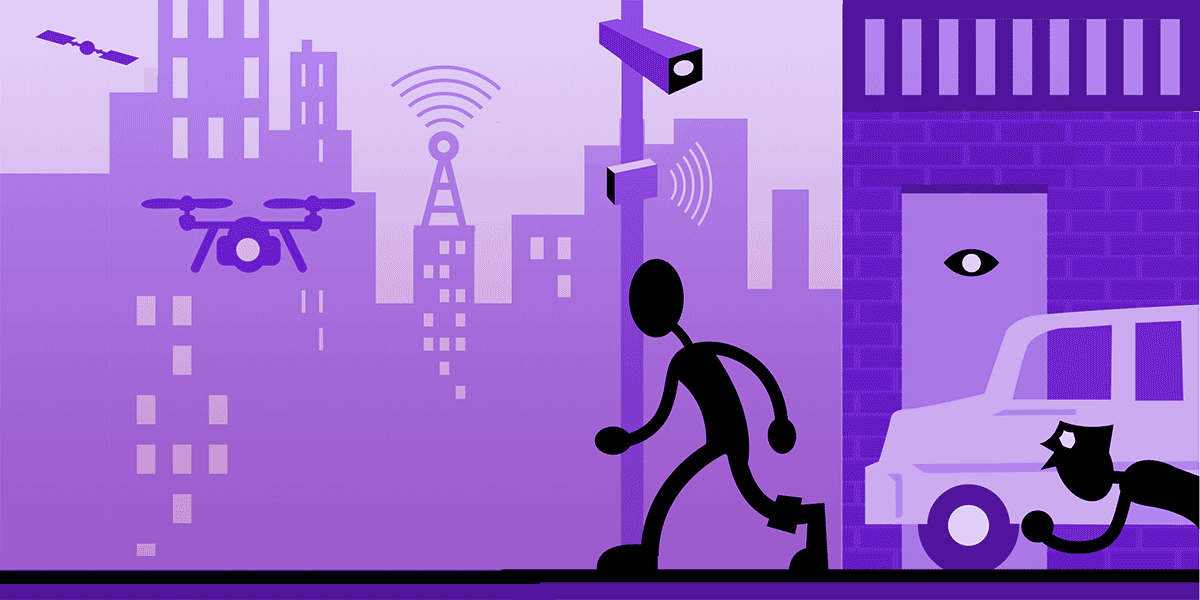San Francisco is considering whether to strengthen or roll back civil rights protections against government surveillance. Nearly three years ago, EFF joined a coalition of community groups to support the city’s passage of the Surveillance Technology Ordinance, which bans government use of facial recognition technology and empowers the Board of Supervisors, with public input, to decide whether or not city agencies may acquire and use other surveillance tech.
A year later, the San Francisco Police Department (SFPD) violated the landmark Ordinance by using a large non-city surveillance camera network to spy on racial justice protests without Board approval. Now, the SFPD and Mayor London Breed are stoking fears about crime in order to gut the Ordinance’s community control provisions with a ballot measure that would create broad exceptions for the police. Several Supervisors have put forward a competing ballot measure to strengthen that community control and the ban on government use of facial recognition technology.
EFF supports the Supervisors’ measure, and opposes the police and Mayor’s measure that would weaken transparency and oversight of police surveillance. The measures can be withdrawn until early March—otherwise, they will go to a city-wide vote in June.
This fight is not just for the civil liberties of San Franciscans, but to protect the Black-led racial justice movement across the country from police backlash. A chief lesson from the protests following the police murder of George Floyd is that communities across the country must have the right to democratically decide how to handle complicated issues of civil liberties, crime, and public safety. San Francisco’s Surveillance Technology Ordinance protects that right and allows communities to say “no” to police surveillance on our streets.
Among its provisions, the Ordinance requires city departments to submit use policies for public debate and Board consideration and approval before they acquire or use surveillance technologies. And while many city departments have complied with the law, the SFPD failed to put forward a use policy for non-city surveillance cameras. Instead, the SFPD unlawfully used a network of over 300 cameras without Board approval to spy on protests for Black lives in May and June 2020, nearly a year after the Ordinance’s passage. EFF and ACLU of Northern California filed a lawsuit on behalf of Black and Latinx activists to hold the police to account.
Despite the SFPD’s disregard of the law, the ballot measure pushed by the Mayor and the SFPD would dramatically expand the “exigency” exception in the Ordinance into a virtually unchecked police surveillance power. The Ordinance currently allows city agencies to use surveillance technology without prior Board approval for at most a week in life-threatening situations. The Mayor’s measure would expand this exception to include “organized theft” and other property crimes. It would also expand unchecked police spy tech in neighborhoods with “public drug sales” or where “violent crime” increases over a two week period—which over time means any neighborhood. It would even authorize the SFPD to continue surveillance indefinitely if the SFPD unilaterally “finds” surveillance to be necessary.
While the Mayor’s talking points focus on surveillance cameras, her measure in fact would expand the SFPD’s authority to use any of its many surveillance technologies. This would enable a new era of surveillance in San Francisco with police getting free rein to use robots, drones, and biometric surveillance, marking a dangerous rollback of civil rights and privacy protections.
EFF supports the competing ballot measure submitted by five Board Supervisors, which would reaffirm and strengthen the Surveillance Technology Ordinance’s civil rights protections. Specifically, it would strengthen the Ordinance’s ban on government use of face recognition. The measure would also ensure that in the future, the Board of Supervisors can only amend the Ordinance, including its community control provisions, to protect the public from surveillance and to safeguard civil rights and civil liberties.
Much of the debate in San Francisco over civil rights and public safety centers around the Tenderloin neighborhood, which has a deep history of LGBTQ struggle. The Mayor’s press release villainizes the Tenderloin as a host to “open-air drug markets” and her measure would turn the neighborhood into a surveillance free-for-all. One longtime resident and queer activist, Juanita MORE!, countered that Tenderloin residents “want solutions, not a surveillance state.”
Indeed, the Black-led racial justice movement that has grown dramatically since the murder of George Floyd has made clear that the oppressed communities most at need for greater public safety do not always look to more policing as a solution. Many people want to address root causes of crime with more healthcare, housing, violence interruption programs, and other non-carceral approaches.
Mayor Breed herself, after a jury convicted a police officer of Floyd’s murder last year, called for “fundamentally restructuring how policing is done … away from an automatic police response” and instead “reinvesting in communities” that have suffered from “systematic disinvestment.” But now, the Mayor wants to give the SFPD a route right back to where police have always been: impunity and secrecy.
This is why EFF opposes the ballot measure put forward by the police and Mayor to undermine the Surveillance Technology Ordinance. And it is also why EFF supports the ballot measure put forward by Board Supervisors to strengthen the Ordinance. We are committed to cutting through panic so that San Franciscans can make informed decisions about this law’s protection of civil rights and privacy. It’s time for this city to show the country once again that surveillance technology does not equal safety or freedom.




